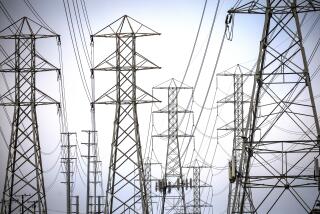Utilities push a solar pricing proposal they say is fairer for non-solar users

Southern California Edison, San Diego Gas & Electric and Pacific Gas & Electric are pushing back against a regulator proposal for new rules on compensating California homeowners and businesses for the solar power they produce.
The three investor-owned utilities have united in an unusual counterproposal that would be less generous to solar-panel owners than the plan that the California Public Utilities Commission is set to vote on next week.
The utilities maintain that electricity customers will continue to shoulder an undue financial burden if the PUC approves the proposed new rules on the compensation system, known as net-energy metering. In regulatory filings and a news release, Edison said the utilities see the need for “a more sustainable future for all customers,” not just those with solar.
The PUC plan involves connection and usage fees for new solar power users. In addition, utilities would place new solar customers on time-of-use rates, which rise during periods of high electricity demand.
In response, the utilities have proposed a fixed rate of compensation that is lower than both the current system and the proposed PUC plan.
Currently, a solar home generating 1,000 kilowatt-hours of electricity a month would be credited on a dollar-for-dollar basis up to 1,000 kilowatt-hours of use. Excess power is sold to the utility at wholesale prices.
Edison did not have any figures immediately available that showed the impact of the utilities’ proposal on solar owners.
“We still go back to the fairness argument, fairness for all of the customers in our service territory,” said Robert Laffoon-Villegas, an Edison spokesman.
Join the conversation on Facebook >>
But at a meeting Wednesday at the PUC’s San Francisco headquarters, the utilities’ proposal was criticized as harmful by the solar industry and its proponents.
“Simply, this proposal would gut [net-energy metering], add complexity and deter customer solar,” said Mark Ferron, a former commissioner who said he was speaking as a citizen on behalf of solar. “I urge you to just disregard it.”
Compton City Councilman Isaac Galvan also traveled to San Francisco to defend strong compensation rules that encourage solar power at homes and businesses.
“We have [government] funds and we allocate a portion of it each year so families can put solar on their roofs,” Galvan said during an interview. “The need is there for our community. I’m a low-income person myself, and I see the benefit.”
Those who backed solar also said the utilities’ move was a violation of protocol as the proposal came after the opportunity for submitting such information to the record had closed.
Under the proposed PUC plan set for vote next week, new solar customers would face a one-time fee for connection to the electric grid. The commission estimates that the fee would range from $75 to $150 per solar customer.
In addition, rooftop solar customers would pay a fee of 2 cents to 3 cents per kilowatt-hour for electricity used from the utility companies, no matter how much power their solar systems generate. This fee would amount to about $5 a month for the average solar user.
Current solar owners would be grandfathered in for 20 years after their systems were installed.
“To go any further south toward the utilities would kill the solar industry,” said Bernadette Del Chiaro, executive director of the California Solar Industries Assn.
Walker Wright, policy director for Sunrun, the nation’s largest residential solar company, said he believes the utilities simply haven’t accepted that solar owners are a fixture in the electricity industry now.
“Rooftop solar,” Wright said, “represents the first true form of competition that the utilities have faced.”
Twitter: @ivanlpenn
ALSO
UberX can pick you up at LAX starting Thursday
2015 was the hottest year on record, and the forecast for 2016 is warmer yet
There’s a ninth planet in our solar system -- we just can’t see it yet, study says
More to Read
Inside the business of entertainment
The Wide Shot brings you news, analysis and insights on everything from streaming wars to production — and what it all means for the future.
You may occasionally receive promotional content from the Los Angeles Times.











